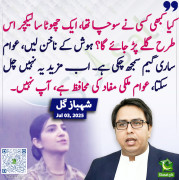You are using an out of date browser. It may not display this or other websites correctly.
You should upgrade or use an alternative browser.
You should upgrade or use an alternative browser.
FaisalLatif
Councller (250+ posts)
The guy in the video is Ghulam Ahmed Perwez, here is some info about him

Allama Ghulam Ahmad Parwez (also transliterated Parvez, Perwaiz, Parvaiz, etc.) (1903–1985) was a prominent Islamic scholar of the Quranist Sect. He urged the Muslims to ponder deeply over the Message of the Quran.
He was very close fellow of Maulana Abul Ala Maududi, founder of Jamat-e-Islami, because of his progressive and liberal views about Islam. Later, Pervez's denial of hadith and its importance led to a rift with Maududi.http://en.wikipedia.org/wiki/Ghulam_Ahmed_Pervez#cite_note-0
His writings illuminatingly describe how Islam was treacherously transformed into a religion by kings who had perverted Islam for their vested interests. "The kings sponsored the creation and fabrication of hadith," he declared. Pervez denounced the Hadith which described Ayesha, the prophet's wife, as a nine-year-old girl. "These are fabricated stories written by the enemies of Islam," he said. He proved from historical record that Ayesha was much older when she married the prophet. Some contemporary Hadither Scholars declared Pervez a heretic for denying the authority and authenticity of the Hadiths. Pervez himself condemned the Mullahs for "always serving as agents of the rich people" and being "promoters of uncontrolled Capitalism." In 1951, Parvez criticized Jamaat-e-Islami through several articles in Tolu-e-Islam.
Quranist rejection of orthodox Muslim theology
Differences in doctrine between Quranists and orthodox Muslims are extant from minor matters to the core of central beliefs such as the five pillars of Islam. Example areas of difference are:
Major punishments approved and applied by the orthodox Sunni and Shi'a madhabs for over a millennia that Quranists reject include:

Allama Ghulam Ahmad Parwez (also transliterated Parvez, Perwaiz, Parvaiz, etc.) (1903–1985) was a prominent Islamic scholar of the Quranist Sect. He urged the Muslims to ponder deeply over the Message of the Quran.
He was very close fellow of Maulana Abul Ala Maududi, founder of Jamat-e-Islami, because of his progressive and liberal views about Islam. Later, Pervez's denial of hadith and its importance led to a rift with Maududi.http://en.wikipedia.org/wiki/Ghulam_Ahmed_Pervez#cite_note-0
His writings illuminatingly describe how Islam was treacherously transformed into a religion by kings who had perverted Islam for their vested interests. "The kings sponsored the creation and fabrication of hadith," he declared. Pervez denounced the Hadith which described Ayesha, the prophet's wife, as a nine-year-old girl. "These are fabricated stories written by the enemies of Islam," he said. He proved from historical record that Ayesha was much older when she married the prophet. Some contemporary Hadither Scholars declared Pervez a heretic for denying the authority and authenticity of the Hadiths. Pervez himself condemned the Mullahs for "always serving as agents of the rich people" and being "promoters of uncontrolled Capitalism." In 1951, Parvez criticized Jamaat-e-Islami through several articles in Tolu-e-Islam.
Quranist rejection of orthodox Muslim theology
Differences in doctrine between Quranists and orthodox Muslims are extant from minor matters to the core of central beliefs such as the five pillars of Islam. Example areas of difference are:
- The shahada (statement of faith). Quranists say 'l ilha illallh' rather than the Sunni l ilha illallh, Muḥammadur raslullh (no god but God, Muhammad is His Prophet) or Shia l ilha illallh, Muḥammadur raslullh, wa Ali unwali ullah (no god but God, Muhammad is His Prophet, Ali is God's regent).
- A menstruating Quranist woman may perform salat (prayer), enter a mosque and touch a quran, as the quran only forbids menstruating women from sexual intercourse or marrying a new man within the first three menstrual cycles of leaving her husband, the Quran offering no further mention of menstruation-related prohibitions.
- As the quran mentions only 3 prayers by name some Quranists combine prayers like Shias, although some pray 5 times like Sunnis. Quranists also do not pray the Tarawih.
- The amount of zakat (alms). Hadithists provide 2.5% of their wealth in a prescribed manner and formulas based on secondary-sources, whilst a quranist is free to donate as much or little as they wish. In fact, the Qur'an itself states that there is no set amount to be given as Zakat.[3]
- Circumcision, either male or female, plays no role in Quranist theology, per ayahs 95:4
and 4:119
. - Orthodox Muslims are encouraged to dress in the way of the prophet Muhammad or his wives. Clothing rules plays no part in Quranist theology other than that the person dress modestly as surah 24:30–31 says. For example hijabs or beards are not necessary.
- Quranists do not hold that breastfeeding a non-related adult male will make him mahram, whilst some Sunni Muslim scholars have said it does;[4] see rada (fiqh)
- Quranists do not believe in the emergence of the Imam Mahdi or dajjal, since they're not mentioned in the Quran.
- Quranists can eat food produced by Christians and Jews, as instructed in surah 5:5.
- Quranists do not touch the black stone of the kaaba.
Major punishments approved and applied by the orthodox Sunni and Shi'a madhabs for over a millennia that Quranists reject include:
- The death penalty for apostates, as this punishment is absent in the Quran; and discouraged in suras such as 2:256 or 18:29.
- Stoning for adultery. Instead, Quranists follow the quran's prescribed punishment of 100 lashings[5] as the Quran does not differentiate between fornicators or adulterers in this punishment, by use of the word 'Zina' (Arabic: الزنا ) in surah 24:2. The orthodox Shariah law applies lashings only to fornicators as per the Quran, but stoning to adulterers as per Sunnah;
- The requirement that the four witnesses of zina must have seen clear penetration during the coitus (though this stringent requirement is rarely applied in practice), as the Quran only requires four witnesses to zina.
- Death penalty of homosexuals. The Quran mentions no punishment for homosexuality other than in a specific reference to prophet Lut's community, a punishment which God alone administers. Quranists instead tend to view homosexuality as a sin that is punishable by God alone in the afterlife;
- Death penalty for practitioners of witchcraft or sorcerers.
FaisalLatif
Councller (250+ posts)
Instead of killing the messenger we should focus on the message.
Is there anything wrong in his interpretation of the Ayas in this video?
FYI He does not believe in sects.
According to Al-Quran those who make sects are not muslims.
Well, this message is not wrong, but this will lead some people to see his other messages, some might not be more controversial than this one. This will lead them to the wrong path of rejecting Hadith.
Nazi Germany had some of the best and most humane animal protection laws, but it does not make Nazis any less evil.
The guy in the video is Ghulam Ahmed Perwez, here is some info about him

Allama Ghulam Ahmad Parwez (also transliterated Parvez, Perwaiz, Parvaiz, etc.) (1903–1985) was a prominent Islamic scholar of the Quranist Sect. He urged the Muslims to ponder deeply over the Message of the Quran.
He was very close fellow of Maulana Abul Ala Maududi, founder of Jamat-e-Islami, because of his progressive and liberal views about Islam. Later, Pervez's denial of hadith and its importance led to a rift with Maududi.
His writings illuminatingly describe how Islam was treacherously transformed into a religion by kings who had perverted Islam for their vested interests. "The kings sponsored the creation and fabrication of hadith," he declared. Pervez denounced the Hadith which described Ayesha, the prophet's wife, as a nine-year-old girl. "These are fabricated stories written by the enemies of Islam," he said. He proved from historical record that Ayesha was much older when she married the prophet. Some contemporary Hadither Scholars declared Pervez a heretic for denying the authority and authenticity of the Hadiths. Pervez himself condemned the Mullahs for "always serving as agents of the rich people" and being "promoters of uncontrolled Capitalism." In 1951, Parvez criticized Jamaat-e-Islami through several articles in Tolu-e-Islam.
Quranist rejection of orthodox Muslim theology
Differences in doctrine between Quranists and orthodox Muslims are extant from minor matters to the core of central beliefs such as the five pillars of Islam. Example areas of difference are:
[edit] Quranist rejection of orthodox Muslim punishments
- The shahada (statement of faith). Quranists say 'l ilha illallh' rather than the Sunni l ilha illallh, Muḥammadur raslullh (no god but God, Muhammad is His Prophet) or Shia l ilha illallh, Muḥammadur raslullh, wa Ali unwali ullah (no god but God, Muhammad is His Prophet, Ali is God's regent).
- A menstruating Quranist woman may perform salat (prayer), enter a mosque and touch a quran, as the quran only forbids menstruating women from sexual intercourse or marrying a new man within the first three menstrual cycles of leaving her husband, the Quran offering no further mention of menstruation-related prohibitions.
- As the quran mentions only 3 prayers by name some Quranists combine prayers like Shias, although some pray 5 times like Sunnis. Quranists also do not pray the Tarawih.
- The amount of zakat (alms). Hadithists provide 2.5% of their wealth in a prescribed manner and formulas based on secondary-sources, whilst a quranist is free to donate as much or little as they wish. In fact, the Qur'an itself states that there is no set amount to be given as Zakat.[3]
- Circumcision, either male or female, plays no role in Quranist theology, per ayahs 95:4
and 4:119
.- Orthodox Muslims are encouraged to dress in the way of the prophet Muhammad or his wives. Clothing rules plays no part in Quranist theology other than that the person dress modestly as surah 24:30–31 says. For example hijabs or beards are not necessary.
- Quranists do not hold that breastfeeding a non-related adult male will make him mahram, whilst some Sunni Muslim scholars have said it does;[4] see rada (fiqh)
- Quranists do not believe in the emergence of the Imam Mahdi or dajjal, since they're not mentioned in the Quran.
- Quranists can eat food produced by Christians and Jews, as instructed in surah 5:5.
- Quranists do not touch the black stone of the kaaba.
Major punishments approved and applied by the orthodox Sunni and Shi'a madhabs for over a millennia that Quranists reject include:
- The death penalty for apostates, as this punishment is absent in the Quran; and discouraged in suras such as 2:256 or 18:29.
- Stoning for adultery. Instead, Quranists follow the quran's prescribed punishment of 100 lashings[5] as the Quran does not differentiate between fornicators or adulterers in this punishment, by use of the word 'Zina' (Arabic: الزنا ) in surah 24:2. The orthodox Shariah law applies lashings only to fornicators as per the Quran, but stoning to adulterers as per Sunnah;
- The requirement that the four witnesses of zina must have seen clear penetration during the coitus (though this stringent requirement is rarely applied in practice), as the Quran only requires four witnesses to zina.
- Death penalty of homosexuals. The Quran mentions no punishment for homosexuality other than in a specific reference to prophet Lut's community, a punishment which God alone administers. Quranists instead tend to view homosexuality as a sin that is punishable by God alone in the afterlife;
- Death penalty for practitioners of witchcraft or sorcerers.
Dear FasalLatif, islam is a deen not a mazhab.
Deen by its very nature is fundamentally about politics, society, culture and economy.
If we therefore ignore what is its real foundation and talk about everything else that is just fringe element then we are playing with our own ignorance about deen and may be that we are also playing in the hands of our enemies who do not want us to look at islam as a deen. This way it suits them because then there is no system to challenge their system.
This also helps our enemies to put into us useless religious ideas about islam that do us no good and do no good for others through us.
Whether you have a beard or not is not as big an issue as that of having an islamic rule of law or not. Having control over land and resources is much more important issue than whether you are wearing the right colour of turben or not.
Now think about people who tell us about deen and who tell us about religion. Who is telling us things that are of much greater benefit for us and who is just pushing us into fights with each other over things that are not important at all.
sir seyyid was condemned because he challenged mullas ignorance. The same happened in case of iqbal or jinnah and this person you are after ie mr parwez.
It would have been great idea if you had studied things yourself and then came up with solid arguments that could stand on their own.
Fatwas are their against any mulla you can think of who is famous. Look at brailvies v deobandies. Shias v sunnies. wahabi v all others and so on and so forth.
What matters is who is talking more sensibly regarding some particular issues.
If we just criticise we can criticise just anyone even those to whom we look up to.
I am very much against mullas but I am always aware of their contributions as well. I am against so many ideas of so many people but still my own knowledge comes from those very people. Despite our scathing attacks on great people humanity has produced so many great human beings. They are like giants compared to ourselves.
So we should learn from all but take what makes better sense to us. Likewise we should learn ilsam from everyone we can but judge right or wrong according to some solid criterion so that we keep ourselves right.
In my view alaama parwez is best scholar of islam there was in his time. It is not possible for any mulla to challenge his views because his views are more realistic and based mostly on clear evidences not just hearsay like mawlanas.
My advice to people is study what he is saying in depth and see for yourself. We need to move even beyond sir seyyid, iqbal, jinnah and parwez etc. That is what their idea was to point us the way to carry on. Mullas on the other hand are ever stuck in the rut. Not going anywhere themselves nor letting us go anywhere.
There is nothing wrong if we disagree with our scholars of old as we discover new things for ourselves. That is what learning is all about. This is why real ulema of islam are not interested in fatwas baazi against each other because that is a way to putting obstacles in the way of new discoveries, progress and prosperity of our own people. Who needs enemies with friends like that who want us to strangle ourselves to death?
regards and all the best.
Last edited:
Last edited:
http://www.youtube.com/watch?v=ilPTiwQIKGg&feature=related
http://www.youtube.com/watch?v=QRlB0CO81MI&feature=related
http://www.youtube.com/watch?v=_TFs_Y43sgc&feature=related
http://www.youtube.com/watch?v=fWkwpJ64LRU&feature=related
http://www.youtube.com/watch?v=GaQHH50sjQ8&feature=related
http://www.youtube.com/watch?v=bElPCm47LOk&feature=related
http://www.youtube.com/watch?v=31cRSbPRXsE&feature=related
http://www.youtube.com/watch?v=QRlB0CO81MI&feature=related
http://www.youtube.com/watch?v=_TFs_Y43sgc&feature=related
http://www.youtube.com/watch?v=fWkwpJ64LRU&feature=related
http://www.youtube.com/watch?v=GaQHH50sjQ8&feature=related
http://www.youtube.com/watch?v=bElPCm47LOk&feature=related
http://www.youtube.com/watch?v=31cRSbPRXsE&feature=related
To the best of my memories, I have first time in life have listened to this Man in the above
video. Although I have some reservations on his quotation specially towards, the Priests
and Monks mentioned and equating them with the people of our Deen, but overall
his concept is clear. He should have been to the point and on some topic, he gave
extraordinary length to the explanations.
[MENTION=5929]patriot[/MENTION] Br, the subject is not what you have written.
[MENTION=10823]mughal[/MENTION] 1, Please define the Deen in your own words in a brief way. I think "Mazab" is
not the Quranic word (May be I am wrong, but think so). and the word deen (religion)
has to be defined. Depending upon your definition, the discussion can proceed, in the
meantime, Deen from whole of Quran:
http://www.quraneasyurdu.net/l00009/religion/p.html
video. Although I have some reservations on his quotation specially towards, the Priests
and Monks mentioned and equating them with the people of our Deen, but overall
his concept is clear. He should have been to the point and on some topic, he gave
extraordinary length to the explanations.
[MENTION=5929]patriot[/MENTION] Br, the subject is not what you have written.
[MENTION=10823]mughal[/MENTION] 1, Please define the Deen in your own words in a brief way. I think "Mazab" is
not the Quranic word (May be I am wrong, but think so). and the word deen (religion)
has to be defined. Depending upon your definition, the discussion can proceed, in the
meantime, Deen from whole of Quran:
http://www.quraneasyurdu.net/l00009/religion/p.html
patriot
Minister (2k+ posts)
[MENTION=7169]babadeena[/MENTION] Br. Thank you for your comments.
I just wanted to point out and highlight specially
these religious leaders who ought to be leading us towards Quran or
Allah.
But they seldom quote the quran and if they do,they explain it by
books other than Gods.= An obstacle in the way of God.
It seems that Allah is talking about non-muslims but the mentality
is the same.
At 14:17 in the clip.
I just wanted to point out and highlight specially
these religious leaders who ought to be leading us towards Quran or
Allah.
But they seldom quote the quran and if they do,they explain it by
books other than Gods.= An obstacle in the way of God.
It seems that Allah is talking about non-muslims but the mentality
is the same.
At 14:17 in the clip.
To the best of my memories, I have first time in life have listened to this Man in the above
video. Although I have some reservations on his quotation specially towards, the Priests
and Monks mentioned and equating them with the people of our Deen, but overall
his concept is clear. He should have been to the point and on some topic, he gave
extraordinary length to the explanations.
@patriot Br, the subject is not what you have written.
@mughal 1, Please define the Deen in your own words in a brief way. I think "Mazab" is
not the Quranic word (May be I am wrong, but think so). and the word deen (religion)
has to be defined. Depending upon your definition, the discussion can proceed, in the
meantime, Deen from whole of Quran:
http://www.quraneasyurdu.net/l00009/religion/p.html
Thank you brother for asking for clarification of deen. DEEN to me means divine rule of law for people to abide by. It is about organising humanity sensibly so that it achieves its heavenly set out goals in this world in light of hereafter accountability.
DEEN v Religion
http://www.aboutquran.com/Islam.htm
regards and all the best.
© Copyrights 2008 - 2025 Siasat.pk - All Rights Reserved. Privacy Policy | Disclaimer|
































